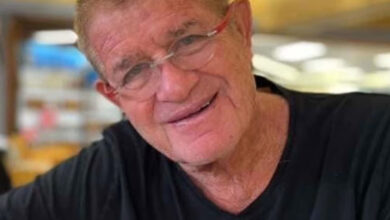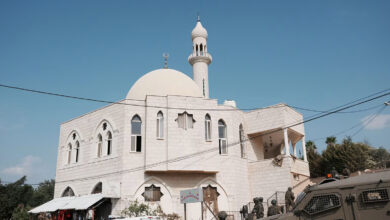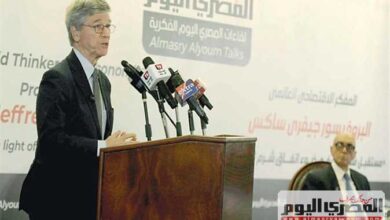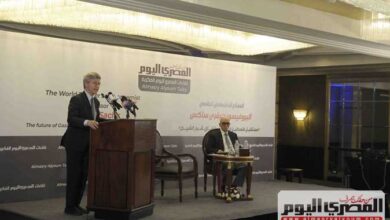In October, Palestinian media reported an alleged meeting in Natzeret Illit, a town near Nazareth, north of the Palestinian territories. The meeting was said to have taken place between Israeli security authorities and social and religious figures, as well as young Christian Palestinians and holders of Israeli nationality, otherwise known as the Arabs of 1948, who stayed in occupied areas.
The meeting, said to have taken place on 16 October, was reportedly aimed at drafting young Christians into the Israeli army.
Though the Arabs of 1948 are exempt from conscription in the Israeli army, a very small number join voluntarily. And while Israel's latest move is seen as a divide-and-rule Israeli tactic against Palestinians and an attempt to Israelize the Arab identity of the lands occupied in 1948, many Israelis call it equality in citizenship.
“This concept — that a part of the population is exempt from defending the country because of their religious affiliation — is not acceptable and never will be acceptable. Defense of the country is the ultimate obligation of citizenship by all its countrymen, without exception,” wrote Israeli commentator Moshe Arens in Haaretz.
But, as news of the meeting broke, denunciations emerged from local Palestinians of all sects, who stressed that their objection was not on a sectarian basis, but rather a nationalist stance by the Arab minority that remained after the 1948 war and Israeli takeover, commonly referred to as the “Nakba.”
The Council of the Arab Orthodox Community in Nazareth issued a statement against the scheme, attacking Father Gabriel Nantaf of the Orthodox Church, who took part in the meeting.
“Since the council is the owner of the Nazareth church, it approves preventing Father Gabriel Nantaf from conducting priestly activities inside the church by any means, as well as excommunicating him from all institutions of the denomination. The council is calling for boycotting him and all who attended that farcical conference in order to make examples of them for anybody who thinks of following their lead,” the statement read.
An old quest
The quest to conscript Arab Palestinians in 1948 territories into the mostly Jewish army goes back to the early years following the inception of Israel and its subsequent rejection by Palestinian religious and civilian leaders.
In 1956, then-Israeli Prime Minister David Ben-Gurion issued a decree to impose obligatory military service on Palestinian Druze. Authorities relied on clerics to pass the decree despite objections from members of the sect.
In similar moves to detach the Druze community from the Arab environment, Israel established in 1959 special municipal councils, courts outside the scope of the Islamic judicial system, and education programs focused on the non-Arab identity of the Druze.
Some young Druze objected to compulsory military service. In 1958, two years after the law was enacted, the Druze established the first movement against obligatory drafting, which Samih al-Qasem, one of its founders, called the Free Young Druze, naming it after Egypt’s 1952 Free Officers movement.
Later, the Druze Initiative Committee was established as an extension to the youth movement in 1972, also having Qasem as a senior leader. Another member of the Free Young Druze was Gamal Zeidan, the first member to be detained for rejecting conscription.
His three sons, Mohamed, Orwa and Agwad, followed suit. Agwad told the judge during his military trial, “Military prison will not force me to change my course. I am now more persistent not to put on a military uniform or carry a weapon in face of my people. I reject military service from a conscientious, nationalist and human perspective.”
Anyone rejecting military service for the above quoted reasons is punished with prison for various terms. Whether declaring his rejection or not, reluctant draftees are referred to a special committee for “conscientious objectors,” which rarely grants exemptions, especially to Arabs.
Since military law is applied for these cases, there is no specific prison term. It may vary from 14 days to two months, up to one year. Continuing to reject military service more than once results in renewed detention.
Resistance continues
Many names of conscientious objectors among Arab Druze have become well-known today. Omar Saad, a young violinist from Galilee’s Maghar village, posted his objection to a conscription summons on 31 October on his Facebook page.
“I completely oppose the compulsory army service for my people of the Druze community,” he wrote.
“Ever since I received the summons, I feel my life has been toppled upside-down. I feel nervous and unable to focus. I remembered the thousands of harsh images and could not see myself in the military uniform and taking part in oppressing my own people, the Palestinians, or fighting my Arab brothers. In fact, I declare myself as a conscientious objector and refuse to serve in any army,” he continued.
Saad’s relatives and friends have created a Facebook page in solidarity with his cause.
The page “Support Omar Saad” has attracted 11,000 members to date.
“I feel proud of the number of supporters and the dozens of youth messages opposing that unjust law,” Saad said in an interview with Egypt Independent.
He called upon young Druze to object to the law, which, he said, has detached them from their nationalist and human identities.
“This law provided the Druze with nothing but more racial discrimination and victims,” he said.
The Haifa-based youth society Baladna is behind another initiative campaigning against Arab conscription. One of the posts published on its site reads, “I won’t be an Israeli army soldier; I do not have a cleaning substance strong enough to wipe off the stain of disgrace.”
Misan Masoud Hamdan, 21, from Asfia village in Haifa, is part of the campaign. She studies Arab literature and East Asian civilization.
She posted her photo with a comment that read, “I belong to a Druze family, and I am against conscription in the Israeli army. I am not the one to fight my people for some lies fabricated by the Zionist movement and implemented in Israeli policies.”
Despite the backing she gained for her stance, Hamdan has had to endure attacks over the past years for her position. She believes countering the compulsory service law should be carried out by raising youth awareness.
“We are experiencing a society where Israelization is entrenched, a society moving toward the abyss; if we do not save it, who will?” she told Egypt Independent.
For those who rebuff military service for religious or medical reasons, or who are exempt, Israel established the “civil service” project.
In recent years, Israeli authorities have been working on intensively enrolling young Palestinians in civil service through educational programs promoted as humanitarian service. Financial temptations and advantages are offered in what many see as a precursor to conscription.
In 2007, young people formed the Coalition Against Civil Service, a movement comprising several political groups from the 1948 territories united with the aim of protecting young Palestinians from the draft scheme and preventing it from expansion. Its ongoing popular campaign includes awareness visits to schools as well as online work.
At the beginning of the campaign, an artistic and musical festival was organized under the motto “The Artistic Pavilion Against Civil Service,” going on tours in several Palestinian towns and villages in the 1948 territories.
Assessing the five-year-old campaign against civil service, Baladna’s director, Nadim Nashef, said, “The latest poll noted that 80 percent of young Palestinians are exhibiting a clear stance against civil service. No doubt there are marginal Israelized sectors of our people, and those are often cases that had inattentively yielded to financial luring. Yet there is clear consensus on the issue.”
“Only one objecting voice helped to sideline anybody trying to draft the youths or to convince them to recant their positions,” he added.
Palestinian commentators have called for national unity in the face of Israel’s attempt to expand its grip over the Arab identity of its acquired territories.
In an article published by the Palestinian newspaper Al-Ittihad, Hisham Naffa wrote that Israeli authorities seek to instigate sectarian divide.
“[Israeli authorities] see us as a demographic threat; even some of its sick leaders are describing us as the major strategic menace, and are trying to eradicate that menace through increased sectarian division,” Naffa wrote. “They instigate us to seek protection from its military against each other. If transferring someone from his land seems less applicable nowadays, sectarianism is the sordid alternative.”
Nashef thinks the issue should be addressed seriously.
“There is an entire establishment allocating huge budgets and recruiting dozens of groups and individuals for the purpose of drafting local Palestinian youth, which makes it an ongoing struggle,” said Nashef.
This piece was translated from Arabic by Mohamed Mostapha.




